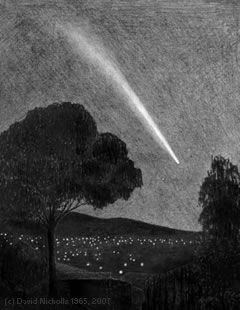I grab a book of short stories by Alice Munro and head for the Dunkin Donuts down the street.
I much prefer it to the more posh cafes around. Like the arena of a professional wrestling match or a pornographic scene - two other artifacts of pure 20th century Americana - a fast-food diner is always brightly and evenly lit. There is no place for shadows. The pop music playing in the speakers, too, is nuance-free and leaves little place for imagination, musical or lyrical. What does this place appeal to me? Perhaps because of the impossibility - and unnecessity - of hiding in it. While one cannot possibly hide here, one still remains essentially unnoticed in this square-shaped panopticon. Visibility and the glances of others do not weigh on the visitor here, they aren't taxing. They bring no shame, and this draws those who carry its sticky mark to this place. Here we are all children of paradise, noisy spectators of the cheap seats, both watching and performing on the light-washed stage. Some days I still prefer to think of myself as an elevated observer. But today I have some acting in mind. Perhaps it is the spring.
I make an entry and order a medium hot chocolate. The girl behind the counter is young, and, despite a few skewed facial features, pretty. I sit down at the table next to the corner one, sip the warmth from the cup and open the book. Munro is known for her ability to create a whole world in one page. This story is about her childhood. Her family has lost all its money and is now very poor, yet her mother puts on her best dress, navy blue with little flowers, and proudly marches down the main street. As if the farm did not go bankrupt, as if nothing has changed. It's an act, a game. They buy a brick of Neapolitan ice cream and head back.
Do I look humble and sensitive reading? What if I support my head like this? Would the girl behind the counter think me cute? Here she comes, wiping the table in front of me, stealing a glance at the book. I pretend not to notice. She looks again, she's intrigued.
"What are you reading?", she asks, feigning casualness. I pretend I am too immersed in the reading to look up straight away. I look at her with a calm and distant smile, holding a pause before answering.
"Short stories by Alice Munro".
"Oh, I love her!", her eyes betray surprise and sudden vulnerability, the way it surfaces when one's image of one's interlocutor changes unexpectedly; when one's view of the other is jolted off comfortable tracks of presumption. How many guys does she know who care about books? About good books?
"Yes, she has an amazing skill of making details come alive and have characters emerge from those details", I am more concerned about my thoughts than about making conversation. She smiles shyly, impressed.
"Do you work here a lot?" I change the subject.
"Mondays and Wednesdays." She is glad to talk about simpler matters. "On Sundays my mother and I often go for ice cream. She puts on her best dress, navy blue with little flowers, and we go down Main street."
At first I am alone in my corner, but now a man and a woman enter. Both middle aged, he is short and bald, dressed in a cheap dotted long-sleeve shirt. She is past her prime, her skin is dark and wrinkled, her nose unattractively flattens at its tip. She seems confused, unconfident. The man, by contrast, smiles enthusiastically and accompanies his excessive gestures with cheerful banter. She hardly answers. He takes her coat and pulls her chair. He inquires what she would like to drink with such concern and interest as if we weren't in a cheap fast-food chain branch that served two kinds of coffee, one kind of hot chocolate, and three kinds of doughnuts that are as dissimilar as three automobile tires of different brands. He leaves for the counter to order.
A short-haired sturdy woman with a nose ring comes in an sits in the corner by me. She grunts as she reaches for the outlet and switches on her laptop. Two young girls come in and sit across from me, next to the window. They talk loudly and passionately. They're pretty, but don't make an impression of ones who would be interested in mid-last-century Neapolitan ice cream - more that of trans-fat-free doughnut lovers who will soon enough become soccer moms in minivans and tights.
My cup is empty, my attention-span exceeded. My little spectacle is over, if it ever begun. It is the turn of other children to stage their acts in the luminous paradise of coffee and dough. I put the book in my bag and head out. The short bald man is still waiting at the counter. He's looking hopeful.
Saturday, March 27, 2010
Subscribe to:
Posts (Atom)
